Nowadays, the Internet has become a "daily life" for people, and its usage rate has also increased significantly among car buyers, creating opportunities for car manufacturers and marketers to create and utilize new media more effectively. According to JD Power's 2015 China Automotive User Media Research SM (AMS), Internet usage after the 80s and 90s is as high as 99%. Chinese car buyers claim that they spend an average of 30.7 hours per week on the Internet (2014: 21 hours), of which 41.4% of online time is spent on smartphones. Faced with this development trend, automakers have plunged into the "automotive e-commerce" trend for more sales.
Car e-commerce is favored, new media is starting to force"Internet +" makes the sales of automobiles from the traditional "car companies - regional distributors - 4S shop" marketing model "gradually changed to O2O mode. Breaking the monopoly of 4S shop sales, further intensifying competition in this industry, the survival of the fittest. According to industry insiders, e-commerce will have a impact on 4S stores, but it will not cause qualitative changes in a short period of time. In addition, “Internet +†has a great impact on car marketing. For example, the proportion of investment in advertising is increasingly focused on new media. , a variety of social applications, such as Weibo, WeChat friends circle, the public number of the car company.
Smart cars become hot spotsThe Internet not only affects the invisible things in the automotive industry, but even the automotive products themselves have been deeply affected. The most obvious is that smart cars are beginning to become a trend. From the perspective of development, smart cars can be divided into two phases, the first phase is the primary phase of the smart car - the assisted driving phase; the second phase is the advanced phase - the driverless phase. The current smart car is in the stage of integration of assisted driving and driverless driving.
At the same time, a large number of Internet companies such as Apple, Google, Tencent, LeTV and so on, have joined the Internet boom to join the "building a car" tide. Some of these Internet companies use their own advanced technology to directly manufacture smart cars, such as Google's unmanned cars that have already appeared, and some focus on the development of automotive smart software, and more to cooperate with car companies to give play to their respective advantages, such as gasoline and Ali. Join hands to build Internet cars, LeTV and BAIC to build super cars.
In addition, with the help of the Internet, car companies can better grasp the status of production vehicles, especially the status of key components, so that they can find common problems and potential failures in advance, avoid large-scale recalls, and ensure vehicle safety. It is also possible to ensure the supervision of the circulation area and the quality of the vehicle during the whole process by monitoring the parts and components, and also to protect the interests of the auto parts manufacturers. Similarly, the aftermarket of the once opaque car has become clear.
"Internet +" drives the automotive aftermarket
The rapid development of the Internet has led to the development of e-commerce in the automotive aftermarket. The e-commerce of the auto parts industry has become a recognized trend in the industry. More and more companies are involved in the auto repair parts industry market in China. Steam-distributors with different business models, such as raising a car, raising a car, worrying about it, Tuhu, Huma Wen, and Che Yi'an, have sprung up. For consumers, direct purchase or customization via the Internet reduces intermediate costs. For car companies, their brand promotion in the automotive aftermarket has increased, and consumers can more accurately and quickly understand the situation of car companies.
China's automobile aftermarket has huge capacity, and the business models of different e-commerce in the market are also different. At present, the domestic automotive aftermarket can be roughly divided into four types of e-commerce models: mall-type e-commerce, C2B user customization, B2C+O2O mode, and B2B2C+O2O mode. The traditional B2C e-commerce model represented by Taobao Tmall and Jingdong has been developed for a long time. This model builds a platform through the Internet, covering a large number of users and a wealth of products, through the credit payment system to solve the payment problem, thus establishing the purchase relationship between the merchant and the consumer terminal. Easy, convenient and transparent car maintenance, making "Internet +" undoubtedly have a profound impact on the automotive aftermarket.
The Internet has far-reaching implications for the automotive industry, both online and offline. The two complement each other. When the so-called "Internet +" concept comes into play, a new ecosystem will be established. Whether it is building a car, selling a car, or after-sales, car insurance, etc., it will create a convenience. A new model for the fast automotive industry.
Yuchai 0-20KW Diesel Generator
Yuchai 0-20Kw Diesel Generator,Yuchai Soundproof Power Generator,Yuchai Canopy Power Generator,Yuchai Mobile Power Generator
Shanghai Kosta Electric Co., Ltd. , https://www.generatorksd.com